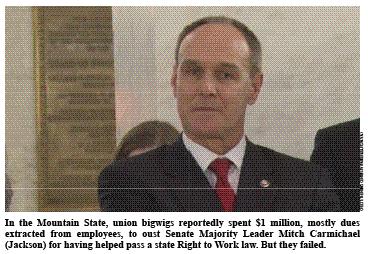Will Team Biden Weaponize Workers’ Pensions?
Big Labor abuse of worker pension and benefit funds as a means of advancing union bosses’ self-aggrandizing policy objectives is a familiar phenomenon.
Among the many rebukes Big Labor bosses received from fed-up voters on November 8, the most bitter of all may have been the results of a number of relatively low-profile, but extremely important state legislative contests in Right to Work West Virginia and Wisconsin.
The Mountain and Badger States are the only two among the 26 Right to Work states that adopted their bans on the termination of employees for refusal to pay dues or fees to an unwanted union since the beginning of 2015.
 War Chest Consisted Largely of Forced Union Dues and Fees
War Chest Consisted Largely of Forced Union Dues and Fees
Consequently, over the course of 2016, voters in West Virginia and Wisconsin had their first opportunities to react at the polls to what their politicians had done.
And in both states, even after Big Labor poured enormous sums of money and manpower into schemes to punish the politicians who had voted for Right to Work, those same politicians fared extraordinarily well in the 2016 primary and general elections.
In a November 16 commentary for the Charleston Daily Mail, former Deputy Secretary of State Stephen Reed reported that union officials had “spent $3 million” trying to punish West Virginia legislators for helping pass the state’s Right to Work law in early 2016.
Given Big Labor’s undeniable expertise at concealing its electioneering expenditures, the real figure was undoubtedly higher still.
And the union bosses’ war chest consisted largely of forced dues and fees extracted from West Virginia employees still compelled to bankroll a union under “grandfathered” workplace contracts and out-of-state employees.
‘They Spent Hard-Earned Union Dues to Try to Return To the [Former] Status Quo’
Since Right to Work legislation passed the state Senate by a very narrow margin, with zero votes to spare, union strategists targeted primarily pro-Right to Work members of the upper chamber.
But West Virginia voters simply refused to cooperate.
When the dust settled after the November elections, the GOP state Senate caucus, which had supplied all of the chamber’s 18 votes for Right to Work the previous winter, had expanded from 18 seats to 22 seats. The uniformly pro-forced unionism Democrat caucus had shrunk from 16 seats to 12.
Union bigwigs reportedly spent $1 million to defeat just one state senator, Majority Leader Mitch Carmichael (R-Jackson). But this massive investment went for naught when Mr. Carmichael beat Big Labor-backed Democrat Brian Prim by nearly a 900-vote margin.
After the election was over, the
staunch Right to Work supporter commented, with regard to union militants:
“They spent hard-earned union dues to try to return to the [former] status quo. I’m just thrilled the people of West Virginia validated this new agenda of progress and a new direction.”
Not One Wisconsin Lawmaker Who Had Voted For Right to Work Was Ousted in November
In Wisconsin, pro-forced unionism Assembly Minority Leader Peter Barca (D-Kenosha) was, prior to November 8, anticipating a “wave” election in which many of the legislators who had helped pass America’s 25th state Right to Work law in early 2015 went down to defeat.
But on Election Night, every single pro-Right to Work legislator who sought reelection was returned to office. In 2017, the Republican legislative leaders who ushered through forced-dues repeal over furious Big Labor opposition will enjoy expanded majorities in the state Assembly and Senate.
National Right to Work Committee Vice President Matthew Leen expressed cautious optimism that elected officials in many states where Big Labor continues to wield forced-dues privileges would learn from the 2016 election returns in West Virginia and Wisconsin.
“The utter failure of union kingpins in November 2012 to make good on their threats to punish Indiana politicians who had helped pass a Right to Work law nine months earlier was certainly a major factor in the subsequent passage of forced-dues bans in Michigan, Wisconsin, and West Virginia,” said Mr. Leen.
“As the evidence continues to mount that voters reward legislators and governors for standing up to the union bosses, I believe there may well be positive repercussions even in states like Minnesota, Pennsylvania and Montana, where recent Right to Work efforts have been uphill.”

Big Labor abuse of worker pension and benefit funds as a means of advancing union bosses’ self-aggrandizing policy objectives is a familiar phenomenon.

Leaked CTU Proposals Won’t Do Anything to Improve Schools’ Poor Performance

What impact does handing a union monopoly power to deal with your employer on matters concerning your pay, benefits, and work rules have on your pay?